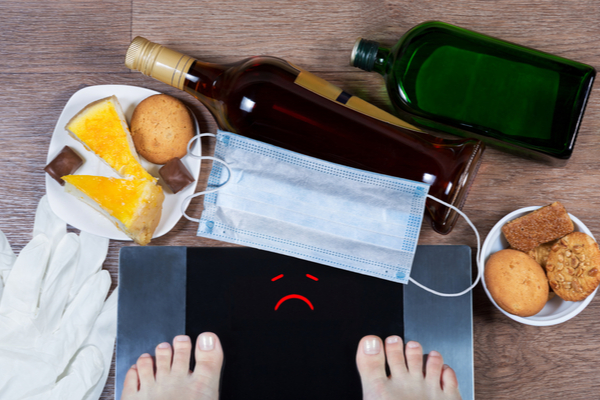Weight gain is a normal physiological reaction to stress. According to Dina Hirsch, PhD, a psychologist at Northwell Health’s Center for Weight Management, our bodies release cortisol, the “fight or flight” hormone, during times of stress. “Cortisol causes cravings for sweet foods,” Hirsch explains, “and when you eat something sweet, you immediately feel better. It’s a quick fix, but one that comes with long-term negative consequences.” Hirsch also says that stress can cause our metabolism to slow down. “So, even if people are eating the same amount as always, they may be gaining weight due to a slower metabolism from stress,” she notes.
When you couple this with a more sedentary lifestyle—now that gyms, yoga and dance studios, and lap pools are closed—it’s a recipe for weight gain. And the bigger problem, says Christine Santori, RDN, a nutritionist at the Center for Weight Management, is that some of these new patterns could become permanent habits. Here’s why this matters more than ever: Not only does obesity put us at greater risk for COVID-19, but a healthy diet and regular exercise can also help boost immunity—something we all need now.
So how do you lose the “Quarantine 19”? Writer Laura Hilgers of Northwell’s “The Well,” tells us how….
Keep a food journal
Place a journal where you’ll see it, and write down everything you eat throughout the day. You’ll quickly see where you’re making unhealthy choices. “People often remember the salad and grilled chicken they ate, but somehow forget the cookies and chips they were snacking on,” says Hirsch. “Keeping a food journal will help you be more mindful of your choices and keep you accountable. It really helps to see it in black and white.”
Plan consistent mealtimes
Now that many of us are working from home, our days have less structure. We may skip breakfast or forget lunch or snack until 10pm for dinner, all of which can lead to weight gain. “I encourage people to set a timer on their phones, like it’s an appointment in your day, so that they have breakfast, lunch, and dinner at the same time every day,” says Santori. Otherwise, the urge to graze on junk food and snacks throughout the day is just too tempting.
Eat meals in a designated place
Yes, you could eat lunch in your bed while watching the news, but don’t. Santori says that to manage weight, you need to consistently sit down for meals at a place designated for eating, such as the dining room or kitchen table.
Focus on whole foods
This is the same advice a nutritionist would give you, whether we were quarantining or not. “Focus on vegetables, fruits, lean protein, and whole grains,” says Santori, “and avoid highly processed foods, which are typically high in refined carbohydrates and fats.” That includes snacks, which Santori says should be limited to one or two a day. For a healthy snack, try a piece of fruit and a few nuts. “That will give you some healthy carbohydrates, proteins, fibers and fats, and satisfy your hunger until the next meal,” she adds.
Listen to your body
Before you open the refrigerator or grab a snack, ask yourself: Are you really hungry? “I think the first thing people need to do is decide whether they’re dealing with head hunger or physical hunger,” says Hirsch. “You can ask yourself: ‘Is my stomach growling? Does my stomach feel empty? When was the last time I ate?’ If you’re not feeling physically hungry, there’s something else going on.” Instead, ask yourself if you’re feeling stressed, bored, or anxious. Pay attention to what’s really happening within your body. Once you know what’s going on, you’ll be better able to address it directly. If you’re feeling stressed, for example, practice a relaxation technique. If you’re feeling depressed, reach out to a friend. “These emotions need attention, but food should not be the primary fix,” says Santori.
Manage your stress
Most of us have never lived with the level of uncertainty we’re experiencing now, and it’s stressful for nearly everyone. But one of the best things you can do to manage your weight is lower your stress. There are a lot of ways to do this. You can limit your exposure to the news. You can practice deep breathing. You can meditate. Even if you’ve never meditated before—or think you “can’t” meditate—there are plenty of apps that make it more accessible, including Calm, Headspace, and Insight Timer. You can also take a walk, try a Zoom yoga class, or do an online workout. Exercise is one of the best stress-relievers, and also great for managing weight.
—
Photo Credit: katiko.dp / Shutterstock.com
